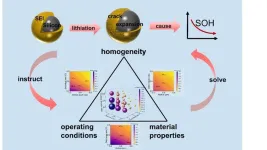(Press-News.org) Philadelphia, May 22, 2024 – Obesity and metabolic disorders are increasingly significant global public health issues. In a novel study, a team of dermatologists evaluated the effect of ultraviolet (UV) exposure on appetite and weight regulation. They found that UV exposure raises norepinephrine levels, decreases leptin levels, and induces the browning of subcutaneous fat, thereby increasing energy expenditure. These results potentially pave the way for new approaches to prevent and treat obesity and metabolic disorders. Their findings appear in the Journal of Investigative Dermatology, published by Elsevier.
UV radiation is a common environmental factor that has multifaceted effects on the skin, which encompasses a substantial surface area of the body. UV radiation induces detrimental effects such as sunburn, photoaging, and skin cancer; however, it is also associated with beneficial effects such as vitamin D synthesis.
Co-first authors Qing-Ling Quan, MD, PhD, and Eun Ju Kim, PhD, Department of Dermatology, Seoul National University Hospital, explained, “Recent evidence has suggested that UV exposure limits body weight gain in mouse models of obesity. Subcutaneous fat is a critical organ in regulating energy homeostasis. Alongside previous studies on the effects of UV exposure on obesity and metabolic disorders, our team was inspired by our prior discovery that, although UV rays do not directly reach subcutaneous fat when exposed to the skin, they can regulate the metabolism of subcutaneous fat. This led us to hypothesize that skin exposure to UV rays could play a significant role in systemic energy homeostasis, prompting this research.”
Investigators discovered that when exposed to UV radiation consistently, mice fed a normal diet and those on a high-fat diet exhibited increased appetite due to a decrease in leptin, a key hormone in appetite regulation. However, there was no weight increase. They found that UV radiation inhibits weight gain by enhancing secretion of the neurotransmitter norepinephrine, which not only decreases leptin but also increases energy expenditure through the “browning” of subcutaneous fat.
The increased energy intake, driven by heightened appetite, is converted to heat and burned before it can accumulate in subcutaneous fat, thus preventing weight gain.
This research provides new insights into the impact of UV exposure on appetite and weight regulation, opening possibilities for novel approaches in the prevention and treatment of obesity and metabolic disorders. Specifically, uncovering the mechanism by which UV radiation prevents weight gain could offer new approaches to dietary regulation and weight loss, providing innovative insights into health and obesity management that could positively impact human health.
Lead investigator Jin Ho Chung, MD, PhD, Department of Dermatology, Seoul National University Hospital, Seoul National University College of Medicine, explained, "This study elucidates the mechanism by which UV exposure can increase appetite while inhibiting weight gain. These findings contribute significantly to understanding the effects of UV radiation on energy metabolism and homeostasis and open new avenues for exploring prevention and treatment strategies for obesity and metabolic disorders. Notably, the fact that UV radiation lowers leptin levels and increases norepinephrine, thereby promoting the browning of subcutaneous fat and increasing energy expenditure, provides a groundbreaking clue for the development of obesity treatment strategies. This research demonstrates that UV exposure not only affects the skin but also plays a deep role in our body's energy metabolism and homeostasis processes. However, further research is needed on the long-term effects and safety of UV exposure, and there should be significant interest in developing new therapeutic approaches that utilize the efficacy of UV radiation.”
However, as co-corresponding author Dong Hun Lee, MD, PhD, Institute of Human-Environment Interface Biology, Seoul National University, noted, “Because UV exposure can accelerate skin aging and promote skin cancer, it is advisable to minimize UV exposure and protect the skin with sunscreen. Thus, our research team plans to conduct follow-up studies to develop new strategies that could mimic the effects of UV radiation for obesity and metabolic regulation.”
END
Dermatologists find ultraviolet irradiation increases appetite but prevents body weight gain
Research published in the Journal of Investigative Dermatology uncovers a possible mechanism by which ultraviolet radiation may impact the regulation of subcutaneous fat, opening up the possibility of new approaches to treat obesity
2024-05-22
ELSE PRESS RELEASES FROM THIS DATE:
Babies in the womb exposed to two languages hear speech differently when born
2024-05-22
It’s well established that babies in the womb hear and learn about speech, at least in the third trimester. For example, newborns have been shown to already prefer the voice of their mother, recognize a story that had been repeatedly told to them while in the womb, and tell apart their mother’s native language.
What wasn’t known until now was how developing fetuses learn about speech when their mother speaks to them in a mix of languages. Yet this is common: there are 3.3 billion bilingual people (43% of the population) worldwide, and in many countries, bilingualism or multilingualism is the norm.
“Here we show that exposure to monolingual or a bilingual speech ...
Study analyses the impact of summer heat on hospital admissions in Spain
2024-05-22
A team from the Barcelona Institute for Global Health, a centre supported by the "la Caixa" Foundation, and the French National Institute of Health and Medical Research (Inserm), has carried out an analysis of hospital admissions related to high summer temperatures in Spain over more than a decade. The study concludes that the causes of hospitalisation in which the heat has the most notable impact are:
Metabolic disorders and obesity
Renal failure
Urinary tract infection
Sepsis
Urolithiasis
Poisoning by drugs and other non-medicinal substances
The research, published in Environmental Health Perspectives, included ...
Ohio State survey finds half of Americans feel unprepared to help in a life-threatening emergency
2024-05-22
COLUMBUS, Ohio – If someone collapsed after going into cardiac arrest, would you be prepared to help? For nearly half of Americans, the answer is no.
A new survey from The Ohio State University Wexner Medical Center finds many Americans are ill-prepared to help in emergency situations.
The national poll of 1,005 people found only 51% of Americans feel they would be able to perform hands-only CPR in an emergency. When it comes to serious bleeding, 49% said they could step in to help. And 56% of survey ...
HPV testing for cervical cancer may be safe at longer intervals than what current guidelines recommend
2024-05-22
Bottom Line: The risk of detecting cervical precancer eight years after a negative human papillomavirus (HPV) screening was found to be similar to the risk after three years (the commonly recommended screening interval) after a negative cytology screening.
Journal in Which the Study was Published: Cancer Epidemiology, Biomarkers & Prevention, a journal of the American Association for Cancer Research (AACR)
Authors: Anna Gottschlich, PhD, MPH, assistant professor at Wayne State School of Medicine and the Barbara Ann Karmanos Cancer Institute
Background: ...
Investigating failure mechanisms of solid electrolyte interphase in silicon particles
2024-05-22
Lithium-ion batteries are widely used in new energy vehicles due to their low self-discharge rate and long cycle life. Currently, the anode material of commercial lithium-ion batteries mainly adopts graphite, with a theoretical capacity of only 372 mAh g-1 — which has gradually failed to meet the increasing demand for energy density.
Silicon has been widely studied by virtue of its high theoretical capacity of 4200 mAh g-1. However, silicon produces volume changes of up to 300% during lithiation and delithiation, and the ensuing mechanical degradation and capacity loss hinder applications. To reduce the adverse effects caused by mechanical deformation, silicon structure optimization ...
Legacy of Indigenous stewardship of camas dates back more than 3,500 years, OSU study finds
2024-05-22
An Oregon State University study found evidence that Indigenous groups in the Pacific Northwest were intentionally harvesting edible camas bulbs at optimal stages of the plant’s maturation as far back as 3,500 years ago.
The findings contribute to the growing body of research around Traditional Ecological Knowledge and practices, demonstrating the care and specificity with which Indigenous groups have been stewarding and cultivating natural resources for millennia.
Camas is an ecological and cultural keystone, meaning it is a species that many other organisms depend on and that features prominently within many cultural practices.
“If you think about salmon as being a charismatic ...
Regular fish oil supplement use might boost first time heart disease and stroke risk
2024-05-22
Regular use of fish oil supplements might increase, rather than lessen, the risk of first time heart disease and stroke among those in good cardiovascular health, but may slow progression of existing poor cardiovascular health and lower the risk of death, suggest the results of a large long term study, published in the open access journal BMJ Medicine.
Fish oil is a rich source of omega 3 fatty acids, and as such, is recommended as a dietary preventive to ward off the development of cardiovascular disease. But the evidence on how much protection it affords is inconclusive, explain the researchers.
To strengthen the evidence base, they set out to estimate the associations ...
Some teen girls clocking up close to 6 smartphone hours/day, Finnish study finds
2024-05-22
Some teenage girls are clocking up close to 6 hours a day on their smartphones, with a significant proportion of them likely addicted to social media, finds research published online in the journal Archives of Disease in Childhood.
Social media addiction was associated with poorer health and wellbeing, the findings indicate.
Recent research has linked increasing levels of anxiety among teen girls with social media use, note the researchers. This may involve several factors, one of which is addiction, with estimated international prevalence ranging from 5% to 31%, they add.
Because both anxiety and social media use are more common among girls, the researchers wanted to: measure ...
Pedestrians may be twice as likely to be hit by electric/hybrid cars as petrol/diesel ones
2024-05-22
Pedestrians may be twice as likely to be hit by an electric or hybrid car as those powered by petrol or diesel, finds a study of 2013-17 casualty rates in Great Britain, and published online in the Journal of Epidemiology & Community Health.
The risk is greater in urban areas, and governments must take steps to mitigate this safety hazard as they proceed to phase out fossil fuelled vehicles to improve air quality and curb climate change, urge the researchers.
Road traffic injuries are the leading cause of death for children and young people, and 1 in 4 road traffic deaths are of pedestrians, they note.
Amid ...
Scientists create tailored drug for aggressive breast cancer
2024-05-22
Scientists have used breast cancer cells’ weakness against themselves by linking a tumour-selective antibody with a cell-killing drug to destroy hard-to-treat tumours.
The research, published today in Clinical Cancer Research by a team from King’s College London and funded by Breast Cancer Now, marks a new method in cancer treatment.
The discovery is particular to triple negative breast cancer, which makes up 15% of all diagnosed breast cancer. This type of breast cancer is typically aggressive, resistant to chemotherapy, has a lower survival rate and is more common in women under 40.
Usual treatment involves surgery, chemotherapy ...
LAST 30 PRESS RELEASES:
Scientists identify smooth regional trends in fruit fly survival strategies
Antipathy toward snakes? Your parents likely talked you into that at an early age
Sylvester Cancer Tip Sheet for Feb. 2026
Online exposure to medical misinformation concentrated among older adults
Telehealth improves access to genetic services for adult survivors of childhood cancers
Outdated mortality benchmarks risk missing early signs of famine and delay recognizing mass starvation
Newly discovered bacterium converts carbon dioxide into chemicals using electricity
Flipping and reversing mini-proteins could improve disease treatment
Scientists reveal major hidden source of atmospheric nitrogen pollution in fragile lake basin
Biochar emerges as a powerful tool for soil carbon neutrality and climate mitigation
Tiny cell messengers show big promise for safer protein and gene delivery
AMS releases statement regarding the decision to rescind EPA’s 2009 Endangerment Finding
Parents’ alcohol and drug use influences their children’s consumption, research shows
Modular assembly of chiral nitrogen-bridged rings achieved by palladium-catalyzed diastereoselective and enantioselective cascade cyclization reactions
Promoting civic engagement
AMS Science Preview: Hurricane slowdown, school snow days
Deforestation in the Amazon raises the surface temperature by 3 °C during the dry season
Model more accurately maps the impact of frost on corn crops
How did humans develop sharp vision? Lab-grown retinas show likely answer
Sour grapes? Taste, experience of sour foods depends on individual consumer
At AAAS, professor Krystal Tsosie argues the future of science must be Indigenous-led
From the lab to the living room: Decoding Parkinson’s patients movements in the real world
Research advances in porous materials, as highlighted in the 2025 Nobel Prize in Chemistry
Sally C. Morton, executive vice president of ASU Knowledge Enterprise, presents a bold and practical framework for moving research from discovery to real-world impact
Biochemical parameters in patients with diabetic nephropathy versus individuals with diabetes alone, non-diabetic nephropathy, and healthy controls
Muscular strength and mortality in women ages 63 to 99
Adolescent and young adult requests for medication abortion through online telemedicine
Researchers want a better whiff of plant-based proteins
Pioneering a new generation of lithium battery cathode materials
A Pitt-Johnstown professor found syntax in the warbling duets of wild parrots
[Press-News.org] Dermatologists find ultraviolet irradiation increases appetite but prevents body weight gainResearch published in the Journal of Investigative Dermatology uncovers a possible mechanism by which ultraviolet radiation may impact the regulation of subcutaneous fat, opening up the possibility of new approaches to treat obesity



